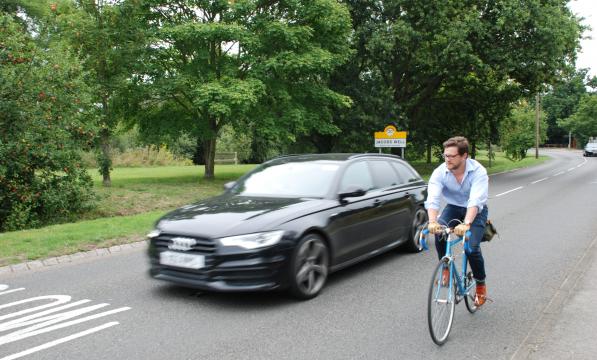Cycling UK hails West Midlands Police for “best cyclist road safety initiative ever”

Close passes of cyclists, sometimes called near misses, put riders at risk and put other people off cycling.
West Midlands Police is the first force in the country to fully appreciate this and commit to a bold and intelligence-led enforcement operation to protect vulnerable road users – a move described as “the best cyclist safety initiative by any police force, ever” by Cycling UK, the national cycling charity.
Highway Code rules clearly state that drivers should allow vulnerable road users as much room as they would a car when overtaking – but many people seem not to know this, and many who do ignore it.
Now West Midlands Police has launched an operation that sees officers saddle up on some of the region’s busiest routes looking out for motorists who put cyclists at risk.
Police cyclists will radio the details of close-pass drivers for in-car colleagues to intercept at a designated holding point.
Drivers will be offered a road-side educational input on safe overtaking but repeat offenders – or anyone deemed to have driven dangerously close to a cyclist – can expect to be prosecuted and taken to court.
Duncan Dollimore, Cycling UK’s Senior Road Safety and Legal Campaigner, said: “Cyclists have been campaigning about close passes for years, with limited success. The priority given to tackling close passes, and the appreciation of the danger they present for cyclists, has varied between police forces.
“This is the first time a police force has come forward with a plan to prioritise enforcement against close pass drivers. It is quite simply the best cyclist safety initiative by any police force, ever.
“West Midlands Police plan to combine enforcement and education to make sure drivers get the message that cyclists need space when being overtaken, and those who don’t give them space risk prosecution for careless driving. It is a simple but effective way to combat a long-standing concern and we hope other police forces around the country will follow their ingenious lead.”
David Cox, Chair of Cycling UK’s Board of Trustees, who lives in the West Midlands, said: “Close passes by motorists are hazardous for cyclists and extremely intimidating. This may be due to ignorance of the Highway Code and carelessness but sometimes it is done deliberately and aggressively.
“We are delighted that West Midlands Police is to actively target close pass drivers. They are the first UK police force to do so and it is a priority if the West Midlands is going to achieve the health, congestion and sustainability benefits of more active travel. The outcome will mean greater safety for everyone who cycles or would like to use a cycle for everyday trips.”
Between 2010 and 2014 there were 530 KSI incidents (killed or seriously injured) in the West Midlands involving bicycles – 84% of them saw riders in collision with cars.
West Midlands Police ran four test days last month ahead of the close-pass clampdown launch during which 80 drivers were pulled over and took part in the road-side educational input and agreed to have their details taken.
Over the summer West Midlands Police has prosecuted 38 motorists for driving without due care and attention having either been spotted by officers committing close passes or through camera evidence supplied by cyclists.
Notes to editors
- Cycling UK, the national cycling charity, inspires and helps people to cycle and keep cycling, whatever kind of cycling they do or would like to do. Over a century’s experience tells us that cycling is more than useful transport; it makes you feel good, gives you a sense of freedom and creates a better environment for everyone. www.cyclinguk.org
- Cycling UK has long campaigned for the rights of cyclists to use the roads safely via our Road Justice campaign. The Road Justice campaign aims to improve the way the justice system handles bad driving in order to actively discourage irresponsible driving and raise driving standards. Safer roads will not only benefit cyclists, but all road users. For further information, visit: http://www.roadjustice.org.uk/
Press contact information
For more information contact the national Cycling UK Press Office on 01483 238 315, 07786 320 713 or email publicity@cyclinguk.org


